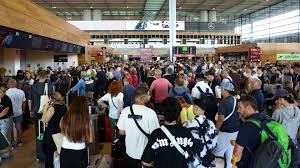Airlines worldwide are gradually resuming services after a massive IT crash caused by an antivirus program update threw global carriers, banks, and financial institutions into chaos.
On Friday, airports were swamped with stranded passengers as numerous flights were canceled. The crash, affecting systems running on Microsoft Windows, disrupted operations across multiple continents. By Saturday, airlines and airports in the U.S., Hong Kong, South Korea, Thailand, and other parts of Asia were reporting restored check-in services.
Keerati Kitmanawat, Airports of Thailand president, confirmed, “The check-in systems have come back to normal at Thailand’s five major airports. There are no long queues as we experienced yesterday.”
Cause of the Crash
Microsoft identified the problem beginning at 1900 GMT on Thursday, linked to CrowdStrike Falcon cybersecurity software. CrowdStrike CEO George Kurtz apologized, saying, “I personally apologize to every organization, every group, and every person who has been impacted.” The company has issued a fix, but full recovery may take days.
The White House is monitoring the situation, with a senior official stating, “Flight operations have resumed across the country, although some congestion remains.”
Broader Impact and Responses
Health services in the Netherlands and Britain, media companies like Sky News and ABC, and financial institutions in Kenya and Ukraine were among those affected. Sydney Airport in Australia still faced delays, although most services were back to normal.
Authorities in Australia warned of increased scam attempts following the outage. Some mobile carriers and customer service operations were also disrupted.
Junade Ali of Britain’s Institution of Engineering and Technology remarked, “The scale of this outage is unprecedented and will no doubt go down in history.”
Recovery Efforts
While some airports had halted all flights, others managed with manual check-ins, leading to long lines and frustrated passengers. The US Federal Aviation Administration initially grounded all flights but services are now being restored.
India’s largest airline, Indigo, announced, “While the outage has been resolved and our systems are back online, we are diligently working to resume normal operations, and we expect this process to extend into the weekend.”
At Delhi Airport, passengers reported operations returning to normal by midnight Saturday. AirAsia advised passengers to prepare for manual check-ins.
Moving Forward
CrowdStrike has mobilized teams to assist affected customers. However, experts like Professor Oli Buckley of Loughborough University warn that a comprehensive fix may be challenging. “Expecting millions to implement the workaround is impractical,” he noted.
This incident highlights the need for resilient infrastructure, as Professor John McDermid from York University pointed out. “We need to be aware that such software can be a common cause of failure for multiple systems at the same time,” he said.
As airlines and institutions work to stabilize operations, this event underscores the critical dependence on technology and the importance of robust cybersecurity measures.






















